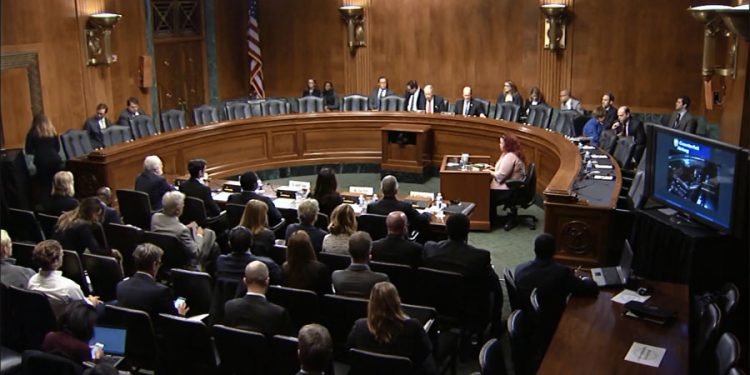The Senate has approved the annual National Defense Authorization Act, authorizing a historic $886 billion in military spending for the fiscal year 2024. The 3,000-page crucial legislation garnered strong bipartisan support, securing a decisive 87-13 vote in the upper chamber. The bill is now poised for consideration in the House before lawmakers adjourn for the holiday season on Thursday.
Notably, the Democrat-controlled Senate opted to navigate around contentious social issues that are significant to conservative legislators. Unlike the House version of the legislation passed earlier this year, the Senate excluded provisions restricting abortion access and transgender healthcare treatment for military personnel and their families.
A particular point of contention during the legislative process was the Pentagon policy reimbursing out-of-state travel for service members seeking abortions, prompting a 10-month protest by Sen. Tommy Tuberville (R-Ala.), who obstructed all military promotions over the policy.
In addition to addressing internal matters, the legislation extends Section 702 of the Foreign Intelligence Surveillance Act until April 19. This surveillance authority allows for warrantless monitoring of foreigners in the United States and was set to expire at the end of December.
The bill also encompasses significant measures, including the largest pay raise for service members in over two decades, with a 5.2% increase slated for the coming year. This pay raise is aimed at bolstering military recruitment and retention efforts. Moreover, the 2024 National Defense Authorization Act allocates $11.5 billion to counter China’s influence in the Indo-Pacific and earmarks $800 million in military aid for Ukraine.
“At a time of huge trouble for global security, doing the defense authorization bill is more important than ever,” Senate Majority Leader Chuck Schumer (D-NY) said on the floor ahead of the vote.
“Passing the NDAA enables us to hold the line against Russia, stand firm against the Chinese Communist Party and ensure America’s defenses remain state of the art at all times.”
President Biden has urgently requested Congress to approve an additional $61 billion in aid for Ukraine by the week’s end. However, prospects for swift approval appear uncertain as both Republicans and Democrats in Congress have indicated hesitations, particularly regarding GOP insistence on incorporating changes to U.S. immigration laws into the Ukraine aid bill.
The National Defense Authorization Act (NDAA) bill, encompassing the requested funding for Ukraine, also plays a pivotal role in facilitating the trilateral AUKUS submarine-sharing agreement between the United States, Australia, and the United Kingdom. Initiated in 2021, the agreement outlines the transfer of three U.S. Virginia-class attack submarines to Australia.
Senate Minority Leader Mitch McConnell underscored the legislation’s importance, stating that it would redirect the Pentagon’s focus toward addressing national security challenges, emphasizing a departure from partisan social policies.
Despite the bill’s significance, a bipartisan group comprising six Republicans and six Democrats voted against its passage. The dissenting senators include Cory Booker (D-NJ), Mike Braun (R-Ind.), Josh Hawley (R-Mo.), Mike Lee (R-Utah), Cynthia Lummis (R-Wyo.), Ed Markey (D-Mass.), Jeff Merkley (D-Ore.), Rand Paul (R-Ky.), J.D. Vance (R-Ohio), Elizabeth Warren (D-Mass.), Peter Welch (D-Vt.), and Ron Wyden (D-Ore.). Notably, Senator Bernie Sanders (I-Vt.) also voted against the legislation.
 Telegram is where we really talk. Don't miss out!
Telegram is where we really talk. Don't miss out!









